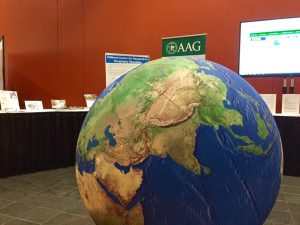
The AmericanAssociation of Geographers Annual meeting 2017 was held from 5-9 April in Boston, USA. It featured over 6,900 presentations, posters and workshops by leading scholars, experts, and researchers. In attendance from City REDI, and giving papers and organising sessions, were Dr Catherine Harris and Professor John Bryson.
Catherine’s paper contributed to a session entitled The European Union after Brexit. Her paper focuses on the experiences and strategies of East European migrant firms in the UK. It explores the significance of translocal exchanges in the establishment and evolution of Polish enterprises in the UK. The paper also considers emerging research opportunities within this field in the light of Brexit and highlights new research into migrant enterprises run by a range of EU nationals, as well as those from Poland. It focuses on the resilience and resources used to cope with the uncertainty of Brexit and what might happen to such businesses following Brexit.
Elsewhere at the AAG, John Bryson gave a paper on Air Rights, Ground Rights and Verticality: Land, Tenure and the Economic Evolution of Cities. His paper highlights that absent from the urban studies literature is a focus on land tenure and especially the separation of legal rights – freeholds and leaseholds. In addition, the separation of ground rights from air rights has become an integral part of a city’s coping strategies in response to pressures to increase density. In response, the paper develops a vertical approach to understanding the evolution of land use in cities with a focus on land tenure and the separation of ground and air rights. The paper was part of a session on City Economic Solutions.
John also co-organised two sessions entitled Interdependent Challenges and Urban Living: Managing Complex Cities, one of which featured a further paper from City REDI. The paper, entitled Diagnosing a City’s Critical Challenges: a Mixed Methods Approach, is based on findings from City REDI’s Urban Living Birmingham project. It was presented by Joanne Leach. It explores the development of an approach to the diagnostics of urban challenges based on a pilot study of Birmingham. It sets out a robust and repeatable mixed methods approach to developing a holistic understanding of a single city for the purpose of identifying the city’s most critical interdependent challenges. In doing so it identified four critical challenge areas for Birmingham: energy; health and wellbeing; economy; and transport and connectivity. The paper asserts that these need to be addressed together.
Also in the session was another paper from Urban Living Birmingham and this was presented by Professor Jon Coaffee, University of Warwick. His paper, Adaptive governance in the complex city, advances an initial institutionalist framework for analysing transformations in urban governance, focused on assessing the potential of initiatives designed to facilitate the co-innovation of urban services between citizens and municipal authority. The paper argues that the interplay of barriers and facilitators of urban governance can illuminate the ability of urban governance to transform and become truly adaptive to shocks and stresses. In doing so it moves towards an idea of adaptive urban governance.
These papers were complemented by a presentation from Dr Paul Vallance of Urban Living Newcastle. The paper reflects on the progress of its emerging ‘quadruple helix’ model as a system for supporting innovation in Newcastle. It considers its potential to fulfil an urban governance and planning role in the English context of a local state being re-shaped by a combination of fiscal retrenchment and piecemeal devolution of powers from central government.
Other papers in these sessions focussed on themes including regeneration, smart cities and infrastructure. Participants included Dr Aksel Ersoy, Oxford Brookes University; Professor Alister Scott, Northumbria University; and Dr Karen Johnston, Lincoln University.
